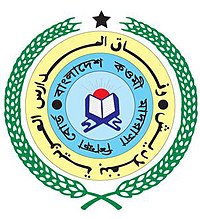Befaqul Madarisil Arabia Bangladesh
 Wifaqul Madarisil Arabia Bangladesh | |
| Formation | April 1978[1] |
|---|---|
| Type | Nongovernmental Education Board, [Islamic Seminaries] |
| Legal status | Board |
| Purpose | Educational |
| Location |
|
Region served | Bangladesh |
Official language | Bengali, Arabic |
Chairman | Mahmudul Hasan |
Senior Vice Chairman | Sajidur Rahman |
Secretary General | Mahfuzul Haque |
Director General (DG) | Ubaidur Rahman Khan Nadvi |
Key people | Muhius Sunnah Allama Mahmudul hassan |
Main organ | Majlis-e-Shura, Majlis-e-Amela |
| Affiliations | Deobandi |
| Website | www |
Wifaqul Madarisil Arabia Bangladesh (Bengali: বেফাকুল মাদারিসিল আরাবিয়া বাংলাদেশ, Arabic: وفاق المدارس العربية بنغلاديش) is the largest Qawmi madrasa education board in Bangladesh. it was founded in April 1978 after a seminar of Islamic scholars.[2] This organization of Qawmi Madrasas of Bangladesh is also known as the "Wifaqul Madaris" (also transliterated as Wifaqul ul Madaris).[3] It is an extension of the process that formed the Wafaq ul Madaris Al-Arabia, Pakistan in 1957.[4] "Bangladesh Qawmi Madrasah Education Board" is the largest federation of Islamic seminaries in Bangladesh. Qawmi educational system practices originate from the traditional Muslim educational system of Bangladesh. At present, there are more than 65,000 Qawmi Madrasahs in Bangladesh.[5] As of 2013, more than 20,000 Seminaries across the People's Republic of Bangladesh are affiliated with "Befaqul Madaris".[1][4] It controls all the seminaries which are run by Deobandi School of thought. Deobandi School of thought is supposed to be the most powerful and dominated school of thought in Bangladesh.
Objectives and functions
[edit]| Part of a series on the |
| Deobandi movement |
|---|
 |
| Ideology and influences |
| Founders and key figures |
|
| Notable institutions |
| Centres (markaz) of Tablighi Jamaat |
| Associated organizations |
The board was founded to assure a standardized curriculum and to provide centralized examination. Membership with the board is voluntary, though required for degree accreditation by the Befaqul Madaris.[4]
The main functions of the federation are: registration of Madrasas, creation of syllabus, checking standard of education, arrangement of examination and issuance of degrees.
Notable institutions
[edit]The following are some of the notable Qawmi Madrasahs in Bangladesh:
- Al-Jamiatul Arabia Kachemul Uloom Kazirhat Hifz Madrasah and Orphanage
- Al-Jamiatul Ahlia Darul Ulum Moinul Islam
- Befaqul Madarisil Qawmia Gawhardanga Bangladesh
- Al-Jamiatul Arabia Haildhar Madrasa
- Jamia Tawakkulia Renga Madrasah
- Jamiatul Uloom Al-Islamia Lalkhan Bazar - also known as Lalkhan Bazar Madrasah
- Jamia Qurania Arabia Lalbagh
- Al-Jamiah Al-Islamiah Patiya
- Jamia Shariyyah Malibagh, Dhaka
- Jamia Rahmania Arabia Dhaka
- Jamia Darul Ma'arif Al-Islamia
See also
[edit]References
[edit]- ^ a b "Information" (PDF). befaq-bd.com. Retrieved 9 May 2014.
- ^ "Microsoft Word - Bangladesh Madrasah Study FINAL.doc" (PDF). Retrieved 24 February 2011.
- ^ "Hefazat-e-Islam: A united front for a divided lot". The Daily Star. Archived from the original on 8 May 2014. Retrieved 8 May 2014.
- ^ a b c "undergraduate - curs - orange 021 & pantone 234" (PDF). Archived from the original (PDF) on 27 July 2011. Retrieved 24 February 2011.
- ^ "Testimony of Samina Ahmed to U.S. Senate Foreign Relations Committee - International Crisis Group". Crisisgroup.org. 19 April 2005. Archived from the original on 3 March 2011. Retrieved 24 February 2011.
Further reading
[edit]- Sakurai, Keiko; Adelkhah, Fariba (7 March 2011). The Moral Economy of the Madrasa: Islam and Education Today. Taylor & Francis. pp. 76–. ISBN 978-1-136-89401-5.
- Harrison, Frances (June 2013). Political Islam and the Elections in Bangladesh (PDF) (Report). Institute of Commonwealth Studies. pp. 126–130. Archived from the original (PDF) on 5 December 2020. Retrieved 19 September 2017.
- "Qawmi degree recognised". The Daily Star. 12 April 2017.
- "Circular issued for Dawra-e-Hadith recognition". Prothom Alo. 13 April 2017. Archived from the original on 20 October 2017. Retrieved 19 September 2017.
